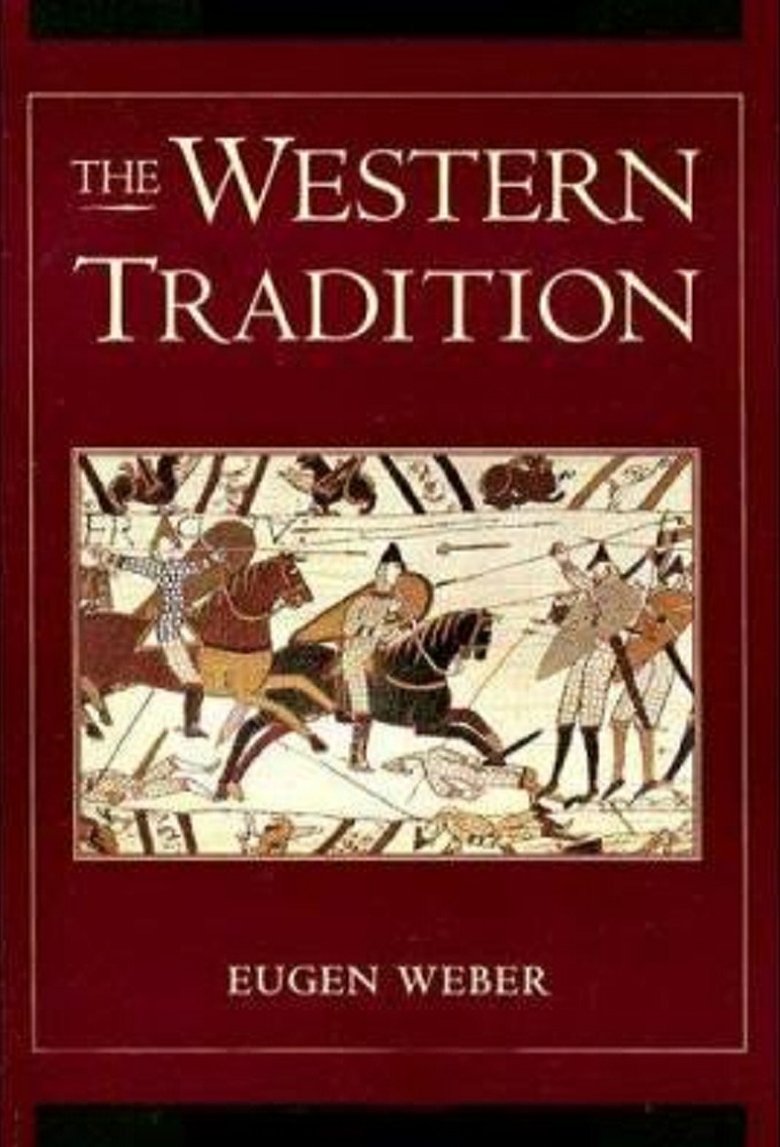

Covering the ancient world through the age of technology, this illustrated lecture by Eugen Weber presents a tapestry of political and social events woven with many strands — religion, industry, agriculture, demography, government, economics, and art. A visual feast of over 2,700 images from the Metropolitan Museum of Art portrays key events that shaped the development of Western thought, culture, and tradition.
Eugen Weber
PBS
52
27 min

The origins of the human race are traced from anthropoid ancestors to the agricultural revolution.
Jan 1, 1989

Egyptian irrigation created one of the first great civilizations.
Jan 1, 1989

Settlements in the Fertile Crescent gave rise to the great river civilizations of the Middle East.
Jan 1, 1989

Metals revolutionized tools, as well as societies, in the empires of Assyria, Persia, and Neo-Babylonia.
Jan 1, 1989

Democracy and philosophy arose from Greek cities at the edge of the civilized world.
Jan 1, 1989

Socrates, Plato, and Aristotle laid the foundation of Western intellectual thought.
Jan 1, 1989

Alexander's conquests quadrupled the size of the world known to the Greeks.
Jan 1, 1989

Hellenistic kingdoms extended Greek culture throughout the Mediterranean.
Jan 1, 1989

Through its army, Rome built an empire that shaped the West.
Jan 1, 1989

Rome's civil engineering contributed as much to the empire as did its weapons.
Jan 1, 1989

Christianity spread despite contempt and persecution from Rome.
Jan 1, 1989

The old heresy became the Roman empire's official religion under the Emperor Constantine.
Jan 1, 1989

While enemies slashed at Rome's borders, civil war and economic collapse destroyed the empire from within.
Jan 1, 1989

Despite the success of emperors such as Hadrian and Marcus Aurelius, Rome fell victim to barbarian invasions.
Jan 1, 1989

From Constantinople, the Byzantine Empire carried on the traditions of Greece and Rome.
Jan 1, 1989

Nearly a thousand years after Rome's fall, Constantinople was conquered by the forces of Islam.
Jan 1, 1989

Barbarian kingdoms took possession of the fragments of the Roman Empire.
Jan 1, 1989

Charlemagne revived hopes for a new empire in Western Europe.
Jan 1, 1989

Amid invasion and civil disorder, a military aristocracy dominated the kingdoms of Europe.
Jan 1, 1989

Bishop, knight, and peasant exemplified some of the social divisions of the year 1000 A.D.
Jan 1, 1989

Famine, disease, and short life expectancies were the conditions that shaped medieval beliefs.
Jan 1, 1989

The great churches embodied the material and spiritual ambitions of the age.
Jan 1, 1989

Two hundred years of war and plague debilitated Europe.
Jan 1, 1989

A new urban middle class emerged, while dynastic marriages established centralized monarchies.
Jan 1, 1989

Renaissance humanists made man "the measure of all things." Europe was possessed by a new passion for knowledge.
Jan 1, 1989

The discovery of America challenged Europe.
Jan 1, 1989

Voiced by Martin Luther, Protestantism shattered the unity of the Catholic Church.
Jan 1, 1989

As the cities grew, new middle-class mores had an impact on religious life.
Jan 1, 1989

For more than a century, the quarrels of Protestants and Catholics tore Europe apart.
Jan 1, 1989

Amid religious wars, a few cities learned that tolerance increased their prosperity.
Jan 1, 1989

Exhausted by war and civil strife, many Europeans exchanged earlier liberties and anarchies for greater peace.
Jan 1, 1989

Arguments about the legitimate source of political power centered on divine right versus natural law.
Jan 1, 1989

Monarchs considered reforms in order to create more efficient societies, but not at the expense of their own power.
Jan 1, 1989

Intellectual theories about the nature of man and his potential came to the fore.
Jan 1, 1989

Scientists and social reformers battled for universal human rights during a peaceful and prosperous period.
Jan 1, 1989

Freedom of thought and expression opened new vistas explored by French, English, and American thinkers.
Jan 1, 1989

The British colonists created a society that tested Enlightenment ideas and resisted restrictions imposed by England.
Jan 1, 1989

A new republic, the compromise of radicals and conservatives, was founded on universal freedoms.
Jan 1, 1989

In France the old order collapsed under revolutionaries' attacks and the monarchy's own weakness.
Jan 1, 1989

Liberty, equality, and fraternity skidded into a reign of Terror.
Jan 1, 1989

Technology and mass production reduced famine and ushered in higher standards of living.
Jan 1, 1989

A consumer revolution was fueled by coal, public transportation, and new city services.
Jan 1, 1989

Leaders in the arts, literature, and political theory argued for social justice and national liberation.
Jan 1, 1989

The great powers cooperated to quell internal revolts, yet competed to acquire colonies.
Jan 1, 1989

Public education and mass communications created a new political life and leisure time.
Jan 1, 1989

Everyday life of the working class was transformed by leisure, prompting the birth of an elite avant-garde movement.
Jan 1, 1989

Old empires crumbled during World War I to be replaced by right-wing dictatorships in Italy, Spain, and Germany.
Jan 1, 1989

World War II was a war of new tactics and strategies. Civilian populations became targets as the Nazi holocaust exterminated millions of people.
Jan 1, 1989

The U.S. and Soviet Union dominated Europe and confronted each other in Korea.
Jan 1, 1989

Burdened with the legacy of colonial imperialism, the Third World rushed development to catch up with its Western counterparts.
Jan 1, 1989

Keeping up with the ever-increasing pace of change became the standard of the day.
Jan 1, 1989

Modern medicine, atomic energy, computers, and new concepts of time, energy, and matter all have an important effect on life in the 20th century.
Jan 1, 1989